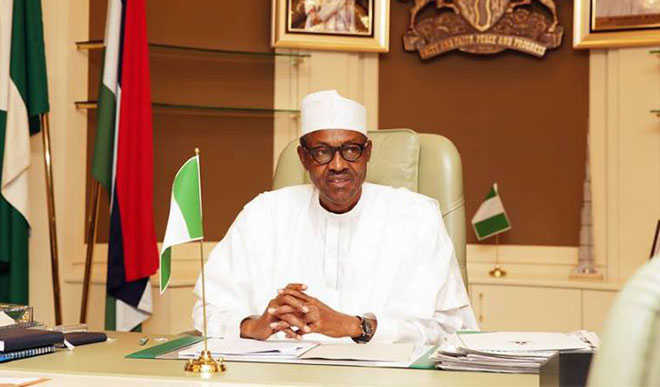
We thought the endorsement of the Nasir el-Rufai committee report on the second tier of policing, also known as state police, by the ruling party, APC, had settled the matter for good. It had fundamentally shifted the ground in the restructuring debate and raised hopes in the cardinals of restructuring that the debate was as good as won. Not so fast, apparently. The one man whose support is critical to this important change has voted against it.
President Muhammed Buhari, as you certainly know by now, told the VOA Hausa Service in Washington last week he was not for it. It must have come as no small shock to his party and the rest of the country. He told his interviewer the first step for the country would be to consult the constitution “first and see what it says. If it says they should be allowed, then they should.”
But no one is asking the president to enforce a constitutional provision in this respect. The framers of the 1999 constitution did not provide for state police. If they did, it would have been in full bloom a full 16 years before Buhari assumed office as president in 2015. What we are asking him to do is to initiate a process to amend the constitution to accommodate state police because the current security situation in the nation shows that the single federal policing system is no longer adequate for our needs. A two-tier policing system would alter positively the architecture of our policing system and, arguably, make the country safer.
It would seem that Buhari’s main reason for his opposition to state police is his fear that the states would not be able to fund it. He raised two important questions. One, “how many times (have) we (had) to release money to states in the name of bailouts to enable them pay salaries?” Two, “how many states are able to pay their workers in time?”
The president’s fear is that given the rather parlous financial state of most of the states, it would be unwise to add the burden of funding a state police to them (because) “you cannot just give someone guns and ammunition, train him and refuse to pay him; you know what will eventually happen.”
Opposition to state police has always rested on fears. One of these was once promoted to a point of paranoia; and that is that the state governors would misuse it against their political opponents and thus worsen the security situation. It would be dishonest not to admit that some of the very nasty characters who see themselves as emperors of their states would not hesitate to deploy the police under their command to oppress, suppress and squash opposition and innocent people in a show of imperial power in their various states. That fear is not entirely baseless but like all fears it rests on what could happen.
You cannot really and wholly prevent those who wield power in government houses and in the board rooms from misusing it when it suits their personal and group interests. That is why laws are there to keep them from going rogue. Our constitution provides checks and balances to ensure that our rulers observe and respect the rule of law. Their general contempt for it of law would be no reason to scrap the rule of law. After all, the fear of criminals breaching the law has never dissuaded nations from enacting legislations for the common good.
Over the years, we have put the fear of the possible misuse of the state police behind us. If the el-Rufai committee had found otherwise, I am sure it would not have recommended the two-tier policing system for the country to the party. I do not think its recommendation was influenced by sentiments or on the need to flow with the current of popularity. I think it was grounded on the shifting architecture of our national needs.
I take the point made by the president in states training and arming their police and failing to pay them as and when due is dangerous. The gun in the hands of an unpaid and hungry police man could be turned into a licence to rob and even kill to survive. It is even now with the Nigeria Police personnel paid regularly. Let us not pretend that the Nigeria Police Force is a paragon of honest enforcement of the law. We know the extent to which some of its personnel co-operate with criminal elements to rob people in their homes and on the roads. And they too rob, for crying aloud. Remember Iyamu and the Lawrence Anini gang? Remember how much Inspector-General of Police, Tafawa Balogun, stole from the force for which he received a slap on the wrist? Bad eggs are everywhere.
The point about the two-tier system of policing is that the security of the country does not rest entirely on the federal government. It was not so envisaged by the constitution. It rests also on the constituent units of the federation, with each doing their part to make the country safe. It is an anomaly for state governors as chief security officers of their states not to exercise some measure of control on the apparatus of security to enable them properly provide security for their people. If things go wrong security-wise they take the blame. It just is not fair.
The constitutional provision creating the state police should give the states the right to exercise the option of as and when they can implement the change. States that wish to continue to rely on the federal police should be allowed that option. There is nothing wrong with this in a federation.
Resisting the formal establishment of the state police gives room to state governments, under security pressure, to resort to a free lance system outside the rubric of the law. The Bakasi Boys in Anambra and Abia states, armed and funded by the state governments to deal with the increasing menace of armed robbers is a case in point. So is the Lagos State Neighbourhood Corps. We need not skirt around this any longer.
Whatever exigencies advised the generals on the wisdom of a uniform federal system have become anachronistic. The time has come for the country to systematically dismantle the stifling single command structure they imposed on it. What we need is a federal system consistent with the best practices in federalism. A centralised federal system is a strange form of government. Let us start with state police. It could be the path to a restructured Nigeria.

 Join Daily Trust WhatsApp Community For Quick Access To News and Happenings Around You.
Join Daily Trust WhatsApp Community For Quick Access To News and Happenings Around You.

